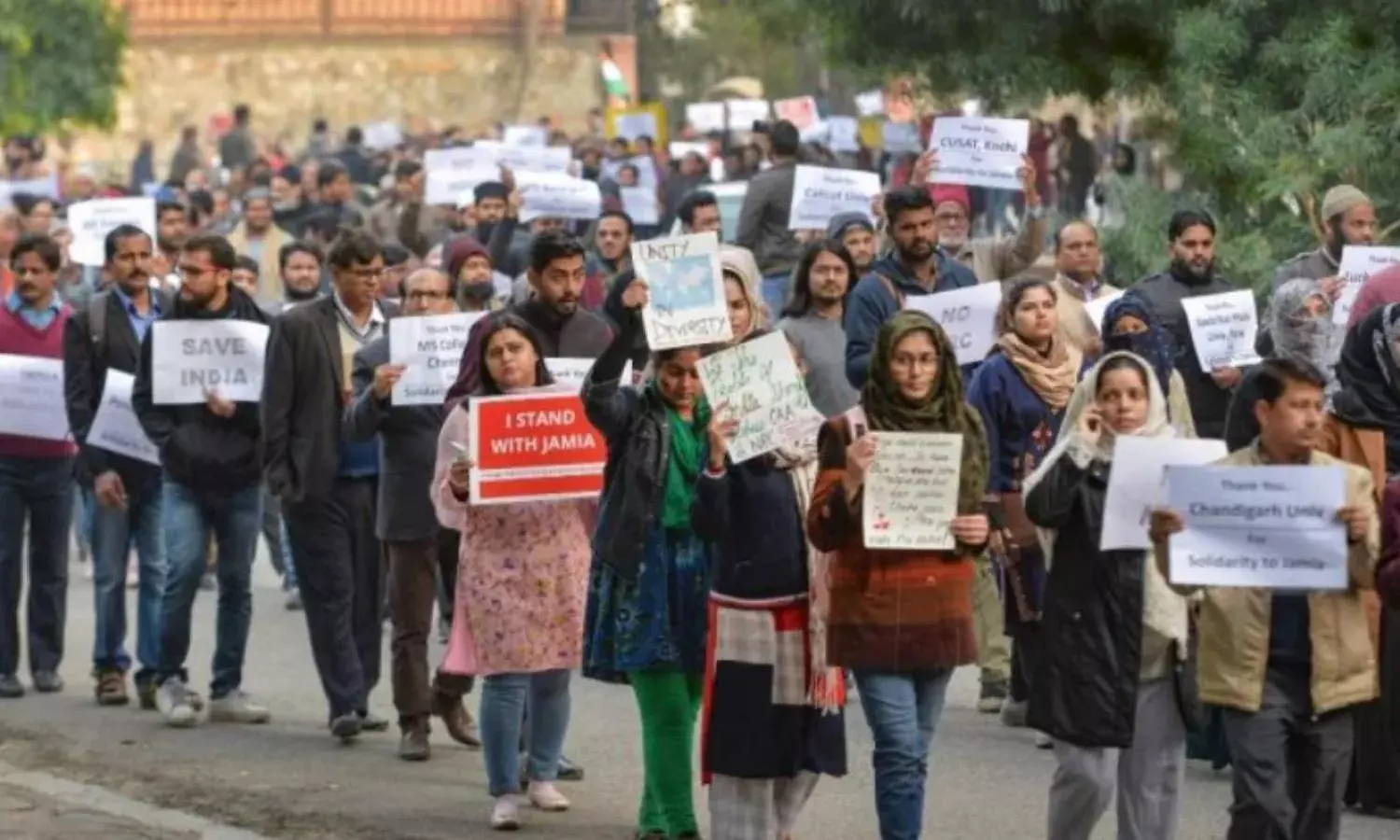Pregnant 27 Yr Old Amongst Series of Arrests Under UAPA in Delhi
List Grows

On April 26, Delhi Police Special Cell arrested Shifa-Ur-Rehman, president of Jamia Alumni Association under the Unlawful Activities Prevention Act, 2019 (UAPA), reported PTI. Also a member of the Jamia Coordination Committee, he was arrested over alleged involvement in Northeast Delhi communal violence that took place in February, killing at least 53 while injuring over a hundred individuals.
“We had technical evidence against him which suggests that he incited mobs during the riots,” the PTI report quoted a police officer as saying. “He was also seen in the CCTV footage which was collected from the riot-affected areas. We have checked his call record details and WhatsApp messages and found more evidence which suggests his involvement in the riots,” the police officer said.
A Delhi court reportedly remanded Rehman to police custody for 10 days for further interrogation.
Delhi Police recently arrested Safoora Zargar, Media Coordinator of the Jamia Coordination Committee (JCC) and Meeran Haider, member of JCC under the UAPA. Haider and Zargar (the latter is reportedly in the second trimester of pregnancy), were accused of allegedly inciting the North-east Delhi communal riots.
Delhi Police also booked former Jawaharlal Nehru University student and activist, Umar Khalid under the Act.
Haider, a PhD student and member of the Rashtriya Janata Dal Delhi youth wing, was arrested on April 2 while Zargar, an M.Phil student was taken into custody a few days later for allegedly blocking the Jaffrabad road during the anti-CAA protests in February. Both are currently in judicial custody. PTI reported that the Police claimed in the FIR that the communal violence was a “premeditated conspiracy”, allegedly hatched by Khalid and two others.
Both students have been booked for offences of sedition, murder, attempt to murder, promoting enmity between groups on grounds of religion and rioting, as per a PTI report.
The FIR further alleged that Khalid had delivered provocative speeches at two places and had appealed to residents of Delhi to come out onto the streets in protest during United States President Donald Trump’s visit to India in an attempt to spread propaganda at a global level. The FIR also claimed that firearms, acid bottles, petrol bombs and stones were collected from various houses.
Over 35 civil society groups and individuals issued a statement on April 16, condemning the arrest of the two Jamia Millia Islamia students, reported Scroll. Prominent film personalities including Anurag Kashyap, Ratna Pathak Shah and Mahesh Bhatt also released a statement against Delhi Police arresting students and activists for protesting against the CAA.
On April 22, Amnesty International India condemned the arrest of the two students under the “draconian” UAPA. Avinash Kumar, Executive Director of Amnesty International India stated, “The Government of India must stop the crackdown on dissenting voices. The use of India’s primary counter-terrorism law UAPA against two students involved in protests against the discriminatory Citizenship (Amendment) Act is an extension of the crackdown on anyone who is critical of the state.”
“A pattern is emerging of the UAPA being used as a tool to repress dissent – further recent examples of the law being abused by the authorities include the cases of photo-journalist, Masrat Zehra, has also been charged over her social media posts from Kashmir early this week, and human rights defenders, Anand Teltumbde and Gautam Navlakha who were arrested last week,” he said.
There was mass outrage on social media last week when news emerged of Masrat Zahra, a Kashmiri photojournalist, being booked by the Jammu and Kashmir police under the UAPA for social media posts that allegedly “glorify” “anti-national activities”.
A statement released by the police on April 20 said, “Cyber police received information through reliable sources that one Facebook user namely Masrat Zahra is uploading anti-national posts with criminal intention to induce the youth and to promote offences against public tranquillity.”
The statement further alleged that Zahra, whose work has appeared in several national and international publications, was “believed to be uploading photographs which can provoke the public to disturb law and order.”
Meanwhile, the Cyber Police Station Kashmir Zone booked journalist and author Gowhar Geelani last week for alleged “unlawful activities” on social media that were viewed as “prejudicial to the national integrity, sovereignty and security of India”.
The Police, in a statement, alleged that several complaints had been received against Geelani for “threatening and intimidation”. On April 24, the Jammu and Kashmir High Court reportedly denied interim protection from arrest to Geelani.
Several activists, writers and scholars had also condemned the cases against scholar, activist and senior professor at Goa Institute of Management, Anand Teltumbde and human rights activist Gautam Navlakha, who were charged under the UAPA and arrested on April 14 in connection with the Bhima-Koregaon case.
The statement by Amnesty International India condemning the arrests of the two Jamia students also makes a reference to Teltumbde, Navlakha and nine other activists who were arrested by the Pune Police in 2018, for allegedly being embroiled in the Bhima-Koregaon case.
The statement reads, “Amnesty International India believes that these new cases under UAPA, along with previous arrests of eleven other activists in relation to the Bhima Koregaon incident, are politically motivated actions that are aimed at silencing those seeking state accountability. The Indian government seems to have failed in its obligation to protect human rights defenders, and the rights to freedom of expression and peaceful assembly.”



